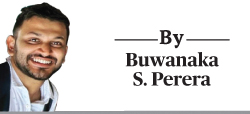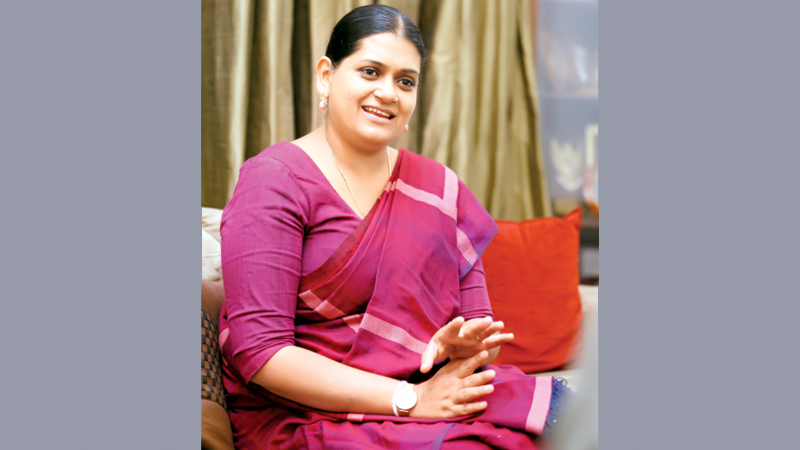 Breaking the long-standing grip of Colombo’s traditional ‘green’ parties, Vraie Cally Balthazaar, a long-time activist has taken office as the city’s second female Mayor, and its first female leftist Mayor.
Breaking the long-standing grip of Colombo’s traditional ‘green’ parties, Vraie Cally Balthazaar, a long-time activist has taken office as the city’s second female Mayor, and its first female leftist Mayor.
Backed by the National People’s Power (NPP), her election marks a dramatic shift in the city’s political landscape. But as Balthazaar is quick to point out, the real work is just beginning.
In her first wide-ranging interview with the Sunday Observer, she speaks about her vision for a city where one’s dignity isn’t determined by one’s bank balance, her plans to address long-ignored problems such as houses, public sanitation, and Colombo’s growing drug crisis, and the need to rebuild not just the infrastructure but the very identity of the city.
“We can’t repeat the mistakes of the past,” she said. “We need a city made for its people — not just for profit.”
Excerpts
Q: This is the first time you are experiencing the office of the Mayor of Colombo. How do you see this positioning and the challenges ahead serving in this new role?
A: I have been active in politics for about eight years now. So this is not something entirely new for me. When a new face is elected, we compare past politicians and their experiences.
You and I live in cities that were built by such politicians. Yes, inside this building (CMC building) everything looks pretty and nice. But it is a different story when it comes to the lives of those who are living in the wattas/slums. My predecessors had the political power but not the political will to change the city.
But we have a better understanding of what the people in the city need. I strongly believe that as a social activist and as a researcher who has been studying the city of Colombo for over seven years, our team and I have the political will to improve this city.
Despite many of us being novices. Still, our team has some experienced members as well. Our Deputy Mayor has been serving in the CMC council for over 23 years. So we have a team of a diverse range of skilled and experienced members.
Q: You secured the office following tough competition against the Opposition candidate. They are alleging that you became Mayor as a result of the secret ballot that was held. What is your opinion on the ballot process?
A: Different Municipal Councils and Urban Councils applied the secret ballot method differently. But for the Colombo city, we acted according to the Act. There are guidelines in the Act that can be interpreted in multiple ways.
But it isn’t unconstitutional. Our opinion was that no one should be felt disadvantaged by the ballot. So in the first round you decide whether the election should be held in secrecy or openly. It was the Opposition themselves who suggested that we shall skip the first debate and go directly to a secret ballot. To which we agreed. There was no argument there.
On what grounds can they claim it is not? Nevertheless, we won the election. It was made clear by this ballot that despite the claims made by the Opposition parties, that a united Opposition does not exist.
My question is what is the ethic and morality behind unifying as an Opposition? For what reason? Do they actually want to unite for the welfare of the people? Uniting for the people of Colombo is no problem whatsoever. But they are uniting for their own agendas.
This is a massive victory for us. We have to secure this power. We can do that only if we work with the people, for the people. Not by wrestling for power. That is the only way to work.
Q: Colombo is a city riddled with a multitude of issues for decades. What sort of a plan do you have to address these issues? The plan to develop Colombo?
A: As the NPP was formed, Colombo was a topic that was discussed. Even in 2023 I came forward as the group leader for the CMC. Even then we had a group of people and experts, within the walls of the Municipal Council and outside, who knew the problems faced by the city and an understanding of the city. Some of the issues in Colombo can’t be fixed from within.
We need the support of the Central Government and the Western Province. For example, if we talk about our canal system, we have to discuss it with the Kotte Municipal Council, Kaduwela Municipal Council. We have an idea as to what should be done for the city. We shall present a comprehensive plan in the coming days.
We want a city in which everyone can live with dignity. The money in your pocket shouldn’t decide this. We have to resolve some of the basic problems faced by the people of this city. We cannot do this in a day or two, but as a party with political will we believe we can. All our work will be people centric. What that means is it is going to be very difficult. Because development and the people’s aspirations are two different things. We have land that has high economical value. People live on these lands. How do we negotiate with them? How can we find a compromise?
But if we don’t have these difficult discussions, we will be repeating the same mistakes of the development plans of the 2010s. Building houses is not the CMC’s responsibility.
But the advantage of us having the Central Government, the Ministries and the CMC is that we can all sit at the table and find solutions.
For example, the Beira is such a complex topic. Many don’t even understand the complexity of this. The Beira is divided between multiple institutions from the SLRDC, CMC to Ports Authority. But now we can plug in together and work on these issues. No Minister can avoid this Municipal Council.
Everyone has a responsibility to work with this city because we have everyone and everything.
In Lunupokuna we have 300 fishing families, we have farmers, we have entrepreneurs. From the largest numbers of slums to the tallest buildings in the country, no Minister or Ministry can skip Colombo.
Our city has more protocols in comparison to all the others in the country. The CMC still can’t even change the name of a road unless the Governor of the Western Province approves it. So we have to navigate all of this.
Q: When we get to specific issues that have plagued the city, public toilets and the garbage issue has always been a talking point for the citizens. What is your plan to address this?
A: The status of the public toilets in Colombo has been deteriorating for a while. While we saw some corporate efforts in the past to address it which must be commended, the whole system of public toilets in Colombo, or the lack of it, must be fixed.
We are open to talk to the corporate sector and work together in improving the public toilets and introducing more toilets to the city.
As for the garbage issue it is not the only thing. Our garbage compactors are from the 90s. We have to work with these. But we are receiving new compactors by the end of the year so we believe the garbage collection process will see some improvement. Even our drains are over 130 years old. We have identified the importance of addressing these problems. We will be working on these.
Q: Aren’t the existing alternatives to address slums in Colombo satisfactory enough? What do you think should be different?
A: In the past when some of these slums were cleared out and were given alternative high rise housing a lot of factors were not taken into account regarding the social welfare of these communities. These wathu were always looked at as a place where bad people gather to do bad things.
Not all of these places are like that. The role women play in these communities. The role elders play. There are so many beautiful things that have taken root in these places. We need to understand the subcultures within these communities. When you go to these highrise flats the wathu subcultures have been turned upside down. The way of life is different.
There is no place for people to meet in the evening and talk. You don’t know who lives in the house above you. The sense of community has deteriorated drastically. When development projects such as these were built they should have been built taking these subcultures and practices of communities into account – finding alternatives within the highrise. So how we address the housing issue will be different from our predecessors. But we will not be providing new houses for people who are already in highrises. We will build and improve facilities so as to cushion the communities from the impacts of the inefficient system.
Q: There is an unaddressed drug epidemic, specifically crystal meth that is slithering its way through the lives of Colombo residents. How do you plan to address this as the Mayor?
A: Yes. This is true. We have to understand the vacuum that created drugs to enter the lives of the youth of this city. There is only so much that the Police can do to stop it and that is not the solution in the long run.
The CMC and the Ministry of Youth together are trying to encourage and improve accessibility to sports among the youth. We need to create safe spaces where the youth can engage in other ways to spend time.
We should create cultural and art hubs within the city. As someone who has been involved in the arts I can tell you we are in need of it here in Colombo. And it should’nt be only for people who can afford it. There should be something for everyone in this city. The people of Colombo need a space to free their minds.
There are different ways people do that. But when there is poor infrastructure for people to relax and express themselves, people seek the endorphins via other avenues such as drugs.
Q: What is your message to the people of Colombo who have now entrusted the next four years of this city to your care?
A: We need a beautiful city, where people live with dignity. A city with a vision. To achieve that we must change from within. This city is such a beautiful amalgamation of a country. You stand on Slave Island, you see four different places of worship. You go to the Kollupitiya Market, you find Sinhalese vendors speaking Tamil.
The identity of this city is not found anywhere else in this country, The identity and the beauty of this city was not seen nor cherished by our predecessors. We will build a city together. A city all of us will come to love.






